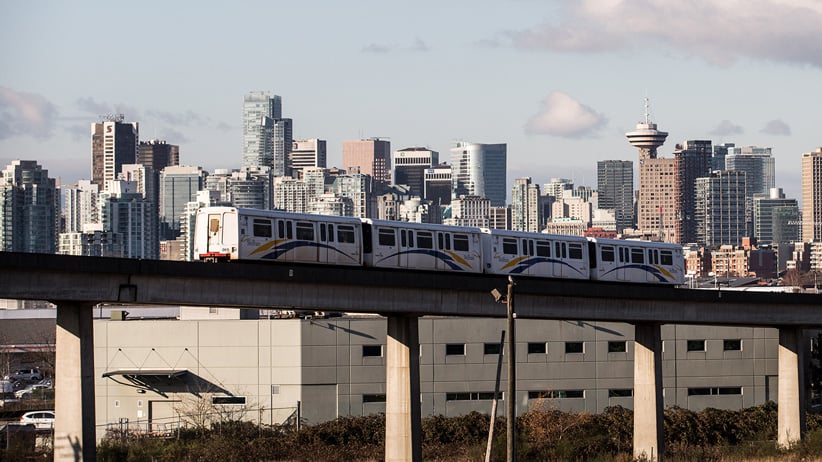The Editorial: B.C.’s wacky transit referendum might work
Christy Clark’s transit referendum is an opportunity to do some civic homework
in Vancouver, B.C. on Sunday December 8, 2013. Carmine Marinelli/Vancouver 24hours/QMI Agency
Share

The Metro Vancouver Transit Referendum, an unfamiliar and (to some) scary exercise, is under way. Voters in a wide area of the Lower Mainland are to cast mail-in ballots deciding the fate of a regional building plan to be funded by a localized half-point increase on the provincial sales tax. B.C. Premier Christy Clark announced the referendum as part of her 2013 election campaign; it was a Gordian-knot slash, designed to alleviate or elude the endless headaches over funding and governance of the regional system. Transit supporters mostly hate it, which is, on its face, a bit mysterious: If the referendum has done nothing else, it has gotten people talking about transit.
The problem, of course, is that they don’t always talk about it in the way transit advocates would prefer. An election campaign is not as easy to control as the usual public hearings that precede a big municipal or regional infrastructure project. The basic question—Is this plan worth the money?—has gotten bogged down in personalities, ideologies, and in questions over the track record of TransLink, the agency that was formed to run Metro Vancouver transit in 1998.
TransLink’s history shows how awkwardly the principle of democracy fits with regional planning. The agency was originally closely controlled by elected mayors, who were, somewhat predictably, preoccupied with their own local preferences. In 2007, the Liberal provincial government, seeking consensus and objectivity, turned power over to an appointed board. That was criticized as undemocratic by some of the same people who don’t like the referendum, and it is obviously one reason a referendum looked attractive to Clark. (They want democracy? Give it to them good and hard!)
The board, being made up of business-minded people, spent like businessmen and made some of the mistakes of businessmen. TransLink lacked electoral-style accountability, but that only invited interference by elected politicians, who concluded they had to fire the CEO of TransLink in the middle of the referendum campaign, adding further static to the discussion.
The bus-huggers know the referendum is a dangerous precedent. This is British Columbia expressing one side of its West Coast personality: Because of reformist and non-partisan traditions on the western half of the continent, many western U.S. states have constitutional requirements for voting on infrastructure projects that require tax hikes. Poor public transit in places such as San Francisco and Los Angeles is thought to be the overall result.
On the other hand, nothing seems to have stopped Portland, Ore., from becoming a transit rider’s dream, and part of the secret there seems to be direct public elections to the council of the planning agency. That regional agency—unique in the U.S., and responsible for much of Portland’s reputation for sustainability-consciousness—was, in turn, originally established by means of a state referendum ballot. So you figure it out.
There is no royal road around public sentiment when it comes to transit planning; that implies, or would seem to, that explicit referendums on specific plans are probably a good thing. Certainly, the gripe from referendum opponents that urban planning ought to be somehow non-political—performed by angels with spreadsheets who are without human interests and prejudices—seems incredibly naive. In places where planning is done “non-politically,” it ends up being more political than ever, with parliamentary deputies, developers and businesses busily greasing the skids behind the scenes. B.C. residents should try telling their Alberta and Saskatchewan neighbours how lucky they are that their road-paving and transit decisions are made in a spirit of squeaky-clean scientific serenity.
Clark’s referendum, however it turns out, ought to have been seen as an opportunity, as well as a potential obstacle. Anyone who has been in one of the American ballot-measure states for an election has to admire the way voters are asked to go about doing their civic homework. If you ask them as individuals, of course, you often find they would rather not have homework. Schoolchildren say the same thing.
By the same token, transit advocates dislike having to make their case to that part of the public that is chronically attached to its minivans and averse to taxes. Teaching to a “class” that extends beyond the usual circle of well-disposed technocrats and allies isn’t natural. The real problem in B.C. is that the province is an inherently screwy constitutional object; if its colonizers all arrived at once today, they would see that the most appropriate number of “provinces” is at least three (the coast, the Okanagan, and the rest) and might be in the double figures.
Since that solution is unavailable, a little constitutional improvisation is to be expected. Improvisation wouldn’t be improvisation if it always turned out perfectly.